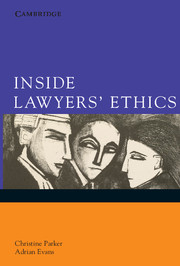Book contents
- Frontmatter
- Contents
- Preface
- Acknowledgments
- List of tables
- List of figures
- List of illustrations
- List of case studies
- Table of statutes
- Table of cases
- 1 Introduction: Values in Practice
- 2 Alternatives to Adversarial Advocacy
- 3 The Responsibility Climate: Regulation of Lawyers' Ethics
- 4 Civil Litigation and Excessive Adversarialism
- 5 Ethics in Criminal Justice: Proof and Truth
- 6 Ethics in Negotiation and Alternative Dispute Resolution
- 7 Conflicting Loyalties
- 8 Lawyers' Fees and Costs: Billing and Over-Charging
- 9 Corporate Lawyers and Corporate Misconduct
- 10 Conclusion – Personal Professionalism: Personal Values and Legal Professionalism
- Index
- References
9 - Corporate Lawyers and Corporate Misconduct
- Frontmatter
- Contents
- Preface
- Acknowledgments
- List of tables
- List of figures
- List of illustrations
- List of case studies
- Table of statutes
- Table of cases
- 1 Introduction: Values in Practice
- 2 Alternatives to Adversarial Advocacy
- 3 The Responsibility Climate: Regulation of Lawyers' Ethics
- 4 Civil Litigation and Excessive Adversarialism
- 5 Ethics in Criminal Justice: Proof and Truth
- 6 Ethics in Negotiation and Alternative Dispute Resolution
- 7 Conflicting Loyalties
- 8 Lawyers' Fees and Costs: Billing and Over-Charging
- 9 Corporate Lawyers and Corporate Misconduct
- 10 Conclusion – Personal Professionalism: Personal Values and Legal Professionalism
- Index
- References
Summary
Introduction
In 2005, the large national Australian law firm, Allens Arthur Robinson (‘Allens’) won the Business Review Weekly – St George ‘Client Choice’ awards for being best large law firm, and also best large professional services firm of the year. The managing partner was quoted explaining how the firm had won these accolades:
We don't run this place as a holiday camp … We expect our people to treat the client as if they were God and to put themselves out for clients. You don't say ‘Sorry I can't do it, I'm playing cricket on the weekend’ … You don't have a right to any free time.
Lawyers employed in commercial law firms and those employed ‘inhouse’ in a company's legal department often also seem to talk and behave as if they have no right to a free conscience or independent moral judgement either. If you are a corporate lawyer, it is not seen as your job to have a moral opinion about your clients' (or employer's) activities. To express one may jeopardise your career.
Traditionally it was thought that the external lawyers for a company were automatically more independent and more capable of giving fearless, ethical advice to corporate clients if they thought their client was behaving wrongfully than were internal or inhouse lawyers employed inside the company whose whole job depended on the company.
- Type
- Chapter
- Information
- Inside Lawyers' Ethics , pp. 212 - 242Publisher: Cambridge University PressPrint publication year: 2007



